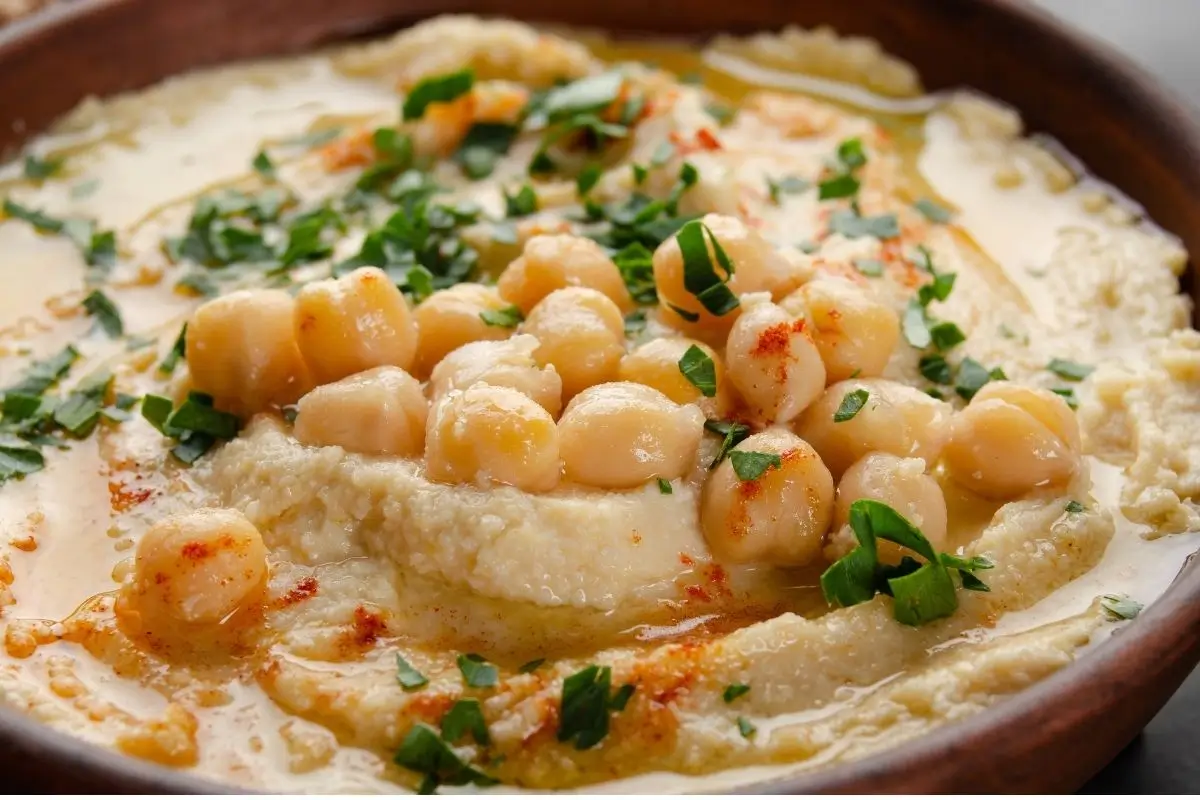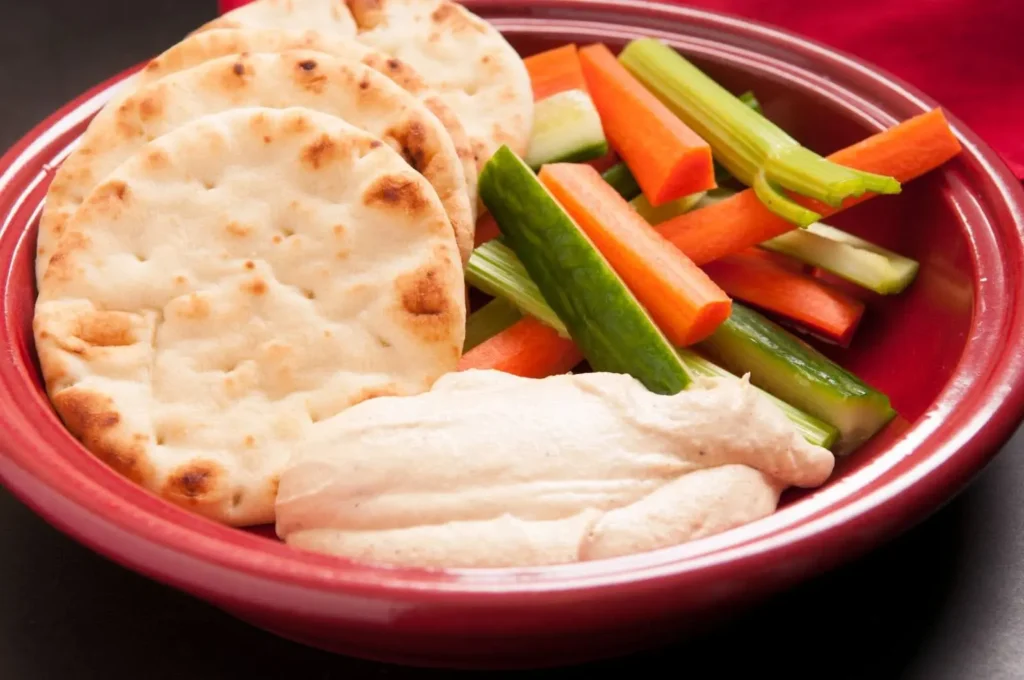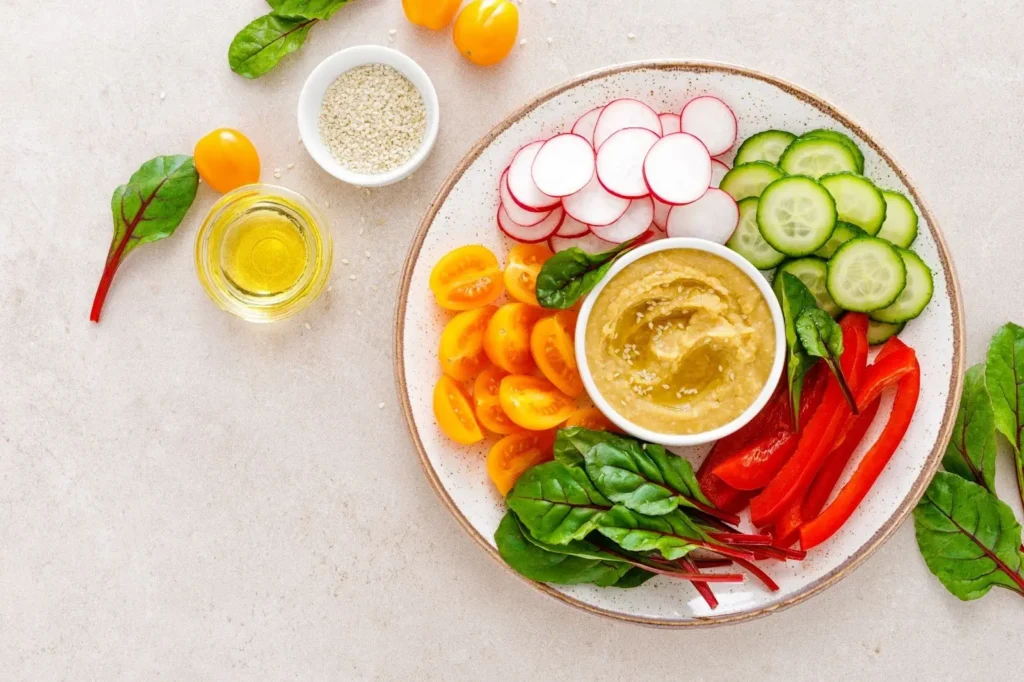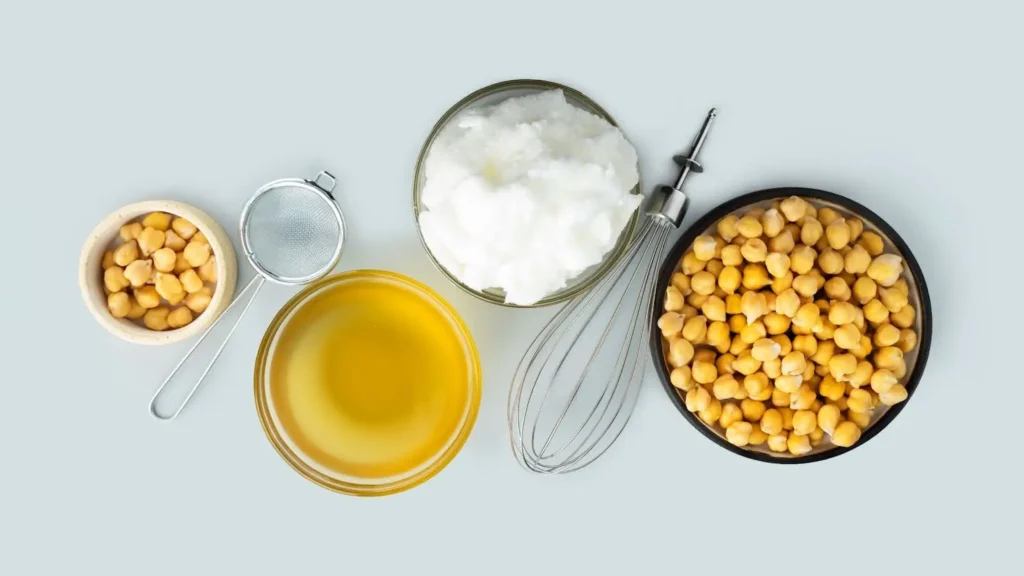Share on social media

Homemade hummus is more than just a dip—it’s a nutrition-packed, easy-to-make, and incredibly versatile snack that’s perfect for today’s health-conscious lifestyle, whether you’re following a plant-based diet, looking for high-protein snacks, or trying to cut back on processed foods. Homemade hummus checks all the boxes.
In this guide, we’ll cover everything you need to know about homemade hummus—from its health benefits and ingredients to how it fits perfectly into a Mediterranean diet. Additionally, we’ll share creative ways to enjoy it and offer tips to keep your batch fresh and flavorful throughout the week.
Homemade hummus is a creamy spread or dip made primarily from chickpeas (also called garbanzo beans), blended with tahini (ground sesame paste), olive oil, lemon juice, garlic, and salt. Originating from Middle Eastern and Mediterranean cuisine, hummus has gained global popularity for its taste, texture, and health benefits.
Unlike many store-bought versions, homemade hummus contains no preservatives or unnecessary oils. It’s naturally vegan, gluten-free, nut-free, and packed with clean, real ingredients.
Homemade hummus is an excellent source of protein, especially for those following vegetarian or vegan diets. Chickpeas and tahini both contain protein, which supports muscle repair, satiety, and energy throughout the day.
Chickpeas offer about 15 grams of protein per cup.
Tahini adds additional amino acids, making it a complete protein source when combined with whole grains.
Fiber is crucial for digestion, blood sugar regulation, and weight management. One cup of chickpeas provides around 12.5 grams of dietary fiber, making hummus a gut-friendly food.
Fiber:
Keeps you full longer
Helps stabilize blood sugar
Supports healthy digestion
May lower cholesterol
Both olive oil and tahini are excellent sources of healthy fats:
Olive oil contains monounsaturated fats that help reduce bad cholesterol (LDL).
Tahini offers a mix of mono- and polyunsaturated fats.
These fats support heart health, reduce inflammation, and improve nutrient absorption.
Homemade hummus has a low glycemic index (GI), meaning it doesn’t cause a rapid spike in blood sugar. This makes it ideal for people with diabetes, insulin resistance, or anyone seeking balanced energy throughout the day.

One of the most significant benefits of making homemade hummus is knowing exactly what nutrients you’re putting into your body. Thanks to its core ingredients—chickpeas, tahini, olive oil, lemon juice, and garlic—homemade hummus is more than just a tasty dip. It’s a concentrated source of essential nutrients that support your health from head to toe.
Iron plays a vital role in transporting oxygen throughout the body. A serving of hummus can help you meet your daily iron needs, which is especially important for women and people on plant-based diets.
Magnesium supports healthy nerve and muscle function. It also helps regulate blood pressure and supports over 300 biochemical processes in the body.
Essential for maintaining strong bones and teeth, phosphorus works alongside calcium to keep your skeletal system strong.
Homemade hummus delivers a range of B vitamins, including folate and B6, which help convert food into energy and support healthy brain function.
These trace minerals are powerful immune boosters. Zinc supports wound healing and immunity, while selenium helps reduce inflammation and oxidative stress.
Olive oil, a key ingredient in hummus, is an excellent source of vitamin E—an antioxidant that protects your skin and cells from damage.
Chickpeas are rich in both fiber and plant-based protein. Together, these nutrients promote satiety, improve digestion, and support weight management by keeping you full longer.
Bottom line: Homemade hummus isn’t just delicious—it’s loaded with nutrients that support energy, immunity, skin health, digestion, and more. That’s what makes it one of the smartest snacks you can add to your daily routine.
Ingredients like garlic, olive oil, and lemon juice aren’t just for flavor—they’re rich in antioxidants that help reduce inflammation and protect cells:
Garlic contains allicin, known for its anti-inflammatory and antibacterial properties.
Olive oil is rich in polyphenols, powerful antioxidants that support heart and brain health.
Lemon juice provides vitamin C, supporting your immune system and skin.
Homemade hummus is an ideal snack for weight management:
High in fiber and protein: Helps control appetite
Low glycemic index: Stabilizes blood sugar and energy
Healthy fats: Keeps you satisfied longer
Nutrient-dense: Supports overall health without empty calories
Portion control is key—2 to 4 tablespoons per serving is a healthy amount. Pair with raw veggies or whole-grain crackers to create a filling, nutrient-rich snack.
The nutrients in hummus do more than support your internal health—they also benefit your skin:
Olive oil is rich in vitamin E, which protects and repairs skin.
Tahini contains zinc, which helps fight acne and supports healing.
The healthy fats keep your skin hydrated and supple.
Adding hummus to your daily routine can contribute to a healthy glow and improve skin texture over time.
One of the best things about homemade hummus is how allergy-friendly it is:
Gluten-free
Dairy-free
Nut-free
Soy-free
This makes it a safe and inclusive snack option for most people, especially at parties, schools, and events where dietary restrictions are a concern.

Hummus is a versatile snack that you can enjoy in many ways. For a crunchy and tasty snack, you can dip fresh veggies like carrots, cucumbers, and bell peppers in hummus. If you like bread, try dipping whole-grain pita bread or crackers in hummus. You can also spread hummus on sandwiches and wraps instead of using mayonnaise or mustard. It adds a delicious flavor and makes your sandwich healthier.
Hummus isn’t just for dipping and spreading, though. You can use it as a base for dressings and sauces, making your salads and meals tastier. If you like experimenting with flavors, you can customize your hummus by adding roasted red peppers, sun-dried tomatoes, or fresh herbs like parsley or cilantro. The possibilities are endless, and you can find your favorite combination!
Hummus is an excellent snack for people with food allergies. It’s naturally gluten-free, nut-free, and dairy-free, making it safe for many people who can’t eat certain foods. This makes hummus a perfect snack for parties or family gatherings because everyone can enjoy it without worrying about allergies while enjoying the health benefits.
When friends are over, you can serve hummus with dippers like fresh veggies, gluten-free crackers, or rice cakes. That way, everyone can enjoy the fun and have a delicious snack. Plus, hummus is made from simple ingredients, so you can be sure it’s safe and a healthy snack for most people.
Hummus ingredients like olive oil and tahini contain vitamins and fatty acids that are good for your skin. Olive oil has vitamin E, which protects your skin from damage and helps it regenerate, making it look fresh and healthy. Tahini, made from sesame seeds, has zinc, which keeps your skin clear and can help prevent acne.
Eating hummus regularly can give your skin a healthy glow. The healthy fats and vitamins in hummus help keep your skin hydrated and smooth. So, not only is hummus a tasty snack, but it also helps you look your best. Next time you enjoy hummus, remember it’s also doing great things for your skin!
Making hummus at home is a breeze. You can create a delicious and healthy snack with simple ingredients like cooked chickpeas, tahini, olive oil, lemon juice, garlic, and salt. Blend them until smooth, adjusting the thickness with water or olive oil. Season it to taste, and voila! You’ve made your homemade hummus, ready to be stored in the fridge for up to a week.

Basic Homemade Hummus Recipe
Ingredients:
1 can chickpeas (drained and rinsed)
1/4 cup tahini
2 tablespoons olive oil
Juice of 1 lemon
1 garlic clove
Salt to taste
2–4 tablespoons cold water (for texture)
Instructions:
Add chickpeas, tahini, lemon juice, and garlic to a food processor.
Blend while slowly adding olive oil and cold water.
Season with salt and adjust to desired texture.
Serve immediately or refrigerate for up to 7 days.
Customize your hummus to fit your mood or meal:
Roasted Red Pepper Hummus: Add roasted peppers for a smoky-sweet flavor
Spicy Hummus: Add cayenne or sriracha
Herb Hummus: Add fresh parsley, cilantro, or basil
Sun-Dried Tomato Hummus: Add chopped sun-dried tomatoes for a Mediterranean twist
Dip with carrots, cucumber, bell peppers, or celery
Spread on whole-grain crackers or pita
Use in wraps and sandwiches instead of mayo
Top grain bowls or salads with a spoonful
Use as a base for veggie flatbreads
Mix into dressings or sauces
Hummus adds flavor, nutrition, and satisfaction to nearly any dish.
Homemade hummus is ideal for meal prep:
Make a big batch once a week
Portion into containers for grab-and-go snacks
Pair with chopped vegetables or pita for easy lunches
Stays fresh in the fridge for up to 7 days when stored in an airtight container.
Because it’s made entirely from plant-based ingredients, homemade hummus has a lower carbon footprint than animal-based snacks. Choosing more plant-forward options supports a more sustainable food system and aligns with growing eco-conscious consumer habits in 2025.
At Aladdin Mediterranean cuisine in Houston, we serve authentic, freshly made hummus every day. Whether you’re dining in, ordering online, or catering a party, our hummus is made from scratch using the highest-quality ingredients.
It’s part of what makes us one of the top-rated Mediterranean restaurants in Houston.
Homemade hummus is one of the smartest, healthiest snacks you can enjoy in 2025. It’s packed with protein, fiber, and healthy fats—supporting digestion, boosting energy, improving skin, and keeping you full.
It’s easy to make, cost-effective, and endlessly versatile. Whether you’re looking for a midday snack, a party dip, or a clean-eating lunch spread, hummus fits the bill.
Start making homemade hummus a regular part of your diet—and if you’re in Houston, let us make it for you.
Yes. It’s high in fiber and protein, which promote fullness and help reduce calorie intake. Just watch your portion size.
Stored in an airtight container in the fridge, it lasts up to 7 days. Always use clean utensils when serving.
Yes. Freeze in airtight containers. Thaw in the refrigerator and stir well before serving. Expect a slightly different texture.
Veggies (carrots, cucumbers, peppers), pita, whole grain crackers, rice cakes, or even apple slices.
Yes. It’s naturally gluten-free, dairy-free, nut-free, and soy-free—making it safe for most people with common allergies.
Homemade hummus is made from cooked chickpeas, tahini (a paste made from sesame seeds), lemon juice, garlic, olive oil, and salt. These ingredients are blended until smooth, creating a creamy, flavorful, and nutritious dip or spread.
Homemade hummus is free from preservatives, artificial flavors, and excess oils found in many store-bought versions. It’s fresher, more customizable, and usually healthier, especially when made with high-quality olive oil and fresh garlic.
Tahini is a paste made from ground sesame seeds. It’s a key ingredient in hummus that gives it a nutty, rich flavor and creamy texture. Tahini is also rich in healthy fats, protein, and minerals such as calcium and iron.
When stored in an airtight container in the refrigerator, homemade hummus typically lasts 5 to 7 days. It’s best to use clean utensils each time to keep them fresh longer.
Homemade hummus can be served as a dip with vegetables, pita, or crackers, or used as a spread in sandwiches and wraps. It also works as a base for dressings, sauces, or grain bowls.
Homemade hummus is rich in plant-based protein, fiber, healthy fats, iron, magnesium, and B vitamins. It supports heart health, digestion, weight management, and energy levels.
Hummus has a low glycemic index, meaning it releases sugar into the bloodstream slowly. This helps stabilize blood sugar levels, making it an excellent option for individuals managing diabetes or insulin resistance.
Canned chickpeas are convenient, but dry chickpeas (soaked and cooked) yield a smoother, creamier texture. Both work well—just be sure to rinse canned chickpeas to reduce their sodium content.
You might like it